Collection of materials relating to neuro-ophthalmology as part of the Neuro-Ophthalmology Virtual Education Library.
NOVEL: https://novel.utah.edu/
TO
1 - 25 of 21
| Title | Creator | Description | Subject | ||
|---|---|---|---|---|---|
| 1 |
 |
Manuscripts: You Can Write These! | Elaine Smolock, PhD | Overview of writing techniques and parts of the manuscript, basic approach to writing results sections, what makes a good introduction, crafting a meaningful discussion, abstract and title suggestions, and how to get your editor's attention. | Writing Techniques |
| 2 |
 |
How to Submit an IRB Application | Elizabeth Frakes, MLIS, AHIP | A general outline of the steps involved in submitting an IRB application for research. | Institutional Review Board (IRB) |
| 3 |
 |
Giant Cell Arteritis: Diagnostic Prediction Models, Temporal Artery Biopsy and Epidemiology | Edsel Ing MD, PhD FRCSC MPH CPH MIAD MEd MBA, | Giant cell arteritis (GCA) is the most common primary vasculitis in the elderly and can cause irreversible blindness, aortitis, and stroke. Diagnostic confirmation of GCA usually entails temporal artery biopsy (TABx) - a time-consuming and invasive test, or ultrasound. The primary treatment of GCA i... | Giant Cell Arteritis; Diagnostic Prediction Model; Epidemiology; Temporal Artery Biopsy; Differential Diagnosis |
| 4 |
 |
Muscular Dystrophy Classification | Brian Villafuerte, MD, Ezequiel Piccione, MD | Presentation covering an overview of muscular dystrophy classification. | Muscular Dystrophy Classification |
| 5 |
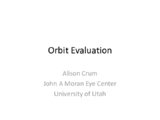 |
Orbit Evaluation | Allison Crum, MD | Presentation covering the evaluation of the orbit. This includes external examination of facial symmetry and skin. Also covered is the evaluation of the orbit. | Orbit |
| 6 |
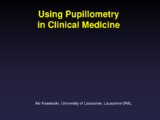 |
Using Pupillometry in Clinical Medicine | Aki Kawasaki, MD | Description of the use of pupillometry in clinical medicine. | Pupillometry |
| 7 |
 |
How to Find Funding Sources | Elizabeth Frakes, MLIS, AHIP | Brief description of funding sources and how to find them. | Funding |
| 8 |
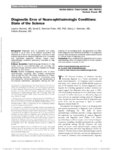 |
Diagnostic Error of Neuro-ophthalmologic Conditions: State of the Science | Leanne Stunkel, MD; David E. Newman-Toker, MD, PhD; Nancy J. Newman, MD; Valérie Biousse, MD | Diagnostic error is prevalent and costly, occurring in up to 15% of US medical encounters and affecting up to 5% of the US population. One-third of malpractice payments are related to diagnostic error. A complex and specialized diagnostic process makes neuro-ophthalmologic conditions particularly vu... | Diagnostic Errors |
| 9 |
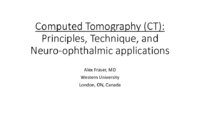 |
Computed Tomography (CT): Principles, Technique, and Neuro-ophthalmic Applications | Alex Fraser, MD | Presentation covering Computed Tomography principles, adverse effects, comparison vs. MRI, and assorted examples of neuro-ophthalmic interest. | Computed Tomography (CT) |
| 10 |
 |
Pituitary Apoplexy | Nagham Al-Zubidi, MD | Patient presented with sudden vision loss left eye, horizontal binocular diplopia, sever headaches, light sensitivity and visual field defect. | Pituitary Apoplexy; Infarction or Hemorrhage of Pituitary Gland |
| 11 |
 |
The Mental Status Examination - Cognitive | James R. Bateman, MD, MPH; Victoria S. Pelak, MD | Introduction to the cognitive mental status examination. See accompanying videos: Executive function: https://collections.lib.utah.edu/ark:/87278/s6bw1rp1, Limb-Kinetic apraxia: https://collections.lib.utah.edu/ark:/87278/s63c084b, Ideomotor apraxia: https://collections.lib.utah.edu/ark:/87278/s674... | Mental Status; Cognitive Function |
| 12 |
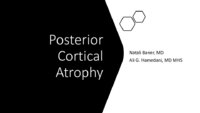 |
Posterior Cortical Atrophy | Natali V. Baner, MD; Ali G. Hamedani, MD, MHS | PowerPoint providing an overview of the definition, clinical presentation and treatment of posterior cortical atrophy | Posterior Cortical Atrophy |
| 13 |
 |
Optochiasmal Tuberculoma | Jeanie Paik, MD; Rudrani Banik, MD | PowerPoint of case of chiasmal tuberculoma causing bitemporal defect in patient with tuberculosis on RIPE treatment; case history, differential diagnosis and treatment discussed. | Chiasmal Disorder; Chiasmal Tuberculoma; Bitemporal Visual Field Defect; Ethambutol Optic Neuropathy |
| 14 |
 |
The Mental Status Examination | James R. Bateman, MD, MPH; Victoria S. Pelak, MD | Introduction to the mental status examination. See accompanying videos: Executive function: https://collections.lib.utah.edu/ark:/87278/s6bw1rp1, Limb-Kinetic apraxia: https://collections.lib.utah.edu/ark:/87278/s63c084b, Ideomotor apraxia: https://collections.lib.utah.edu/ark:/87278/s67410xj | Mental Status |
| 15 |
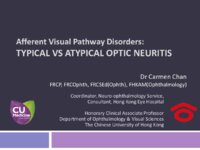 |
Afferent Visual Pathway Disorders: Typical vs Atypical Optic Neuritis | Carmen Chan, FRCP, FRCOphth, FRCSEd(Ophth), FHKAM(Ophthalmology) | Discussion of typical vs atypical optic neuritis. | Optic Neuritis |
| 16 |
 |
Clinical Visual Electrophysiology | Gregory P. Van Stavern, MD; Byron Lam, MD | A description of the use of electrophysiology to examine the visual system. | Electrophysiology; Visual Exam |
| 17 |
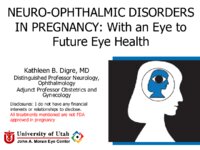 |
Neuro-ophthalmic Disorders in Pregnancy: With an Eye to Future Eye Health | Kathleen B. Digre, MD | Presentation covering conditions relevant to neuro-ophthalmology, including vascular disorders that affect vision, Pseudotumor Cerebri Syndrome, venous sinus thrombosis, idiopathic intracranial hypertension, and severe pre-eclampsia and eclampsia. | Pregnancy |
| 18 |
 |
Whipples Disease (Guest Lecture) | Shirley H. Wray, MD, PhD, FRCP | The patient is a 44 year old woman with a past history of ethanol abuse. She was transferred to the Massachusetts General Hospital (MGH) on 3/10/93 for evaluation of memory impairment, hypothalamic dysfunction and a one month history of diplopia and ataxia. In February 1992 (13 months PTA), she deve... | Somnolence; Supranuclear Paralysis of Up and Downgaze; Vertical gaze palsy (c); Absent convergence; Pendular vergence oscillations; Bilateral lid nystagmus; Tropheryma Whippelii - Infection; CNS Whipple's Disease; Supranuclear Paralysis of Up and Downgaze Infection-Whipple's Disease |
| 19 |
 |
Protecting Human Subjects in Biomedical Research | Lisa R. Latchney, MS, CCRC | PowerPoint discussion of the history and development of ethics regulations in health research. | Ethical Issues in Research; Consent |
| 20 |
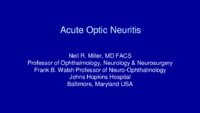 |
Acute Optic Neuritis | Neil R. Miller, MD, FACS | Overview of acute optic neuritis. | Optic Neuritis |
| 21 |
 |
Genetic Information Nondiscrimination Act of 2008 | Senate and House of Representatives of the United States of America in Congress | Law to prohibit discrimination on the basis of genetic information with respect to health insurance and employment. | Genetics |
1 - 25 of 21
